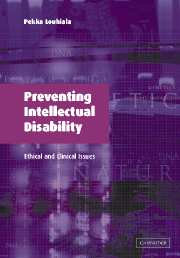Book contents
- Frontmatter
- Contents
- Acknowledgements
- 1 Introduction
- 2 On the definition of intellectual disability?
- 3 Epidemiology of intellectual disability
- 4 Prevention of intellectual disability: general issues
- 5 Prenatal diagnosis and screening
- 6 Genetic counselling
- 7 Why should intellectual disability be prevented?
- 8 Moral status and intellectual disability
- 9 The ethics of prevention in practice: three syndromes
- 10 Conclusion
- References
- Index
4 - Prevention of intellectual disability: general issues
Published online by Cambridge University Press: 09 August 2009
- Frontmatter
- Contents
- Acknowledgements
- 1 Introduction
- 2 On the definition of intellectual disability?
- 3 Epidemiology of intellectual disability
- 4 Prevention of intellectual disability: general issues
- 5 Prenatal diagnosis and screening
- 6 Genetic counselling
- 7 Why should intellectual disability be prevented?
- 8 Moral status and intellectual disability
- 9 The ethics of prevention in practice: three syndromes
- 10 Conclusion
- References
- Index
Summary
‘It is better to be healthy than ill or dead. That is the beginning and the end of the only real argument for preventive medicine. It is sufficient.’ These lines were written by Geoffrey Rose in his book The Strategy of Preventive Medicine (Rose 1992, p. 4), which is an introduction to the ideas behind preventive medicine at the individual and population levels. The citation is the humanitarian argument for prevention. Rose also described the economic argument, which, according to him, proves to be misleading or even false when scrutinised more closely in individual cases.
Rose writes about preventive medicine, which, of course, covers intellectual disability only partly. As seen in Chapter 2, ID is not exclusively (and in many cases not at all) a medical matter but is also a social construction. Thus a person with ID may be healthy and the discussion about prevention must go beyond the scope of medicine. In this chapter the concept of prevention is first defined. Secondly, the question ‘Why should ID be prevented?’ is introduced. Thirdly, the general strategies and practical possibilities for preventing ID are described. Fourthly, the ethical issues that arise in the context of this prevention are briefly introduced.
Levels of prevention
Prevention is usually divided into three levels: primary, secondary and tertiary (American Association on Mental Retardation 1992).
Primary prevention refers to actions that occur before the onset of the problem and that stop the problem from occurring.
- Type
- Chapter
- Information
- Preventing Intellectual DisabilityEthical and Clinical Issues, pp. 31 - 40Publisher: Cambridge University PressPrint publication year: 2003



